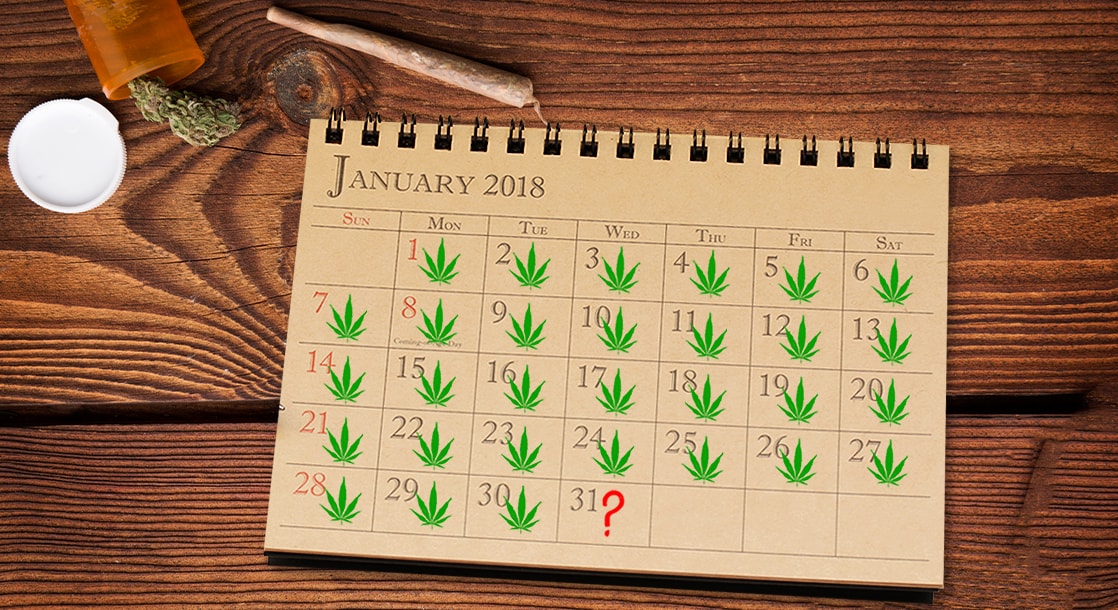It's officially been a month since the launch of California's new adult-use and medical cannabis market — a much anticipated moment in weed history since citizens passed Prop 64 to legalize marijuana in November 2016.
While the first couple days (or even weeks) of the new legal program were met with a good deal of hype — think lines winding out the door at dispensaries like MedMen in West Hollywood, Harborside in Oakland, or Grass Roots in San Francisco — things have more or less settled down. As the majority of weed businesses are still scrambling to participate in the new market, the licensees are amending their businesses to comply with the new regulations.
"Overall, we're pleasantly surprised, and things seem to be going relatively smoothly," says Alex Traverso, chief of communications at the California Bureau of Cannabis Control (BCC). To have almost 2,000 state licenses issued for commercial cannabis activity is a success, he says. At the time of interview on January 24th, the BCC, which oversees cannabis retail, distribution, and lab testing in the Golden State, had issued about 800 licenses; the Department of Food and Agriculture, which oversees cultivation, had issued around 700; and the Department of Public Health, which oversees manufacturing, had issued 455.
The greatest hurdle is still local licensing — once a canna-business has approval from their local jurisdiction, which is required for a state license, the latter is fairly quick and easy to obtain. Other than that, there have been smaller issues here and there, such as running out of certain products like edibles. (In anticipation of the new regulation that licensees can only do business with other licensees, most dispensaries had stocked up on product prior to January 1st to ensure they'd have enough merchandise while their product providers get permitted.)
All license holders currently only have temporary licensing, meaning that the permit lasts just four months until they would presumably be awarded an annual license from the state. There's little difference between the two license types, save for that the temporary license is free and the annual license accompanies a fee that's proportionate to an operator's sales or estimated sales.
Then of course, there's the issue of enforcement for those who are operating without a license or out of compliance with their licensure. BCC enforcement folks have been going around the state responding to complaints, often filed via the licensing system website. These complaints are often related to issues like unlicensed activity or lack of child-resistant packaging, says Traverso. "Right now, what we're doing more than anything is trying to provide education to those folks. There hasn't been any action yet," he says. "We're not closing doors necessarily, we're going to these people and telling them they have to comply with state regulations, and here's what they need to do." Once the BCC follows up, if the operators are still out of compliance, then they'll risk action against themselves.
With the launch of the legal program, dispensaries saw a massive increase in traffic. "We had a line from the time we opened till the time we closed, processing about 1,400 to 1,500 people a day through the shop," recounts Steve DeAngelo, executive director of Harborside Health Center in Oakland. "What we noticed is that for the most part, medical cannabis patients were stocked up before January 1st and many of them have not turned to the legal market yet. But we're seeing a lot of folks who are what we call 'new adopters,' who don't have much, if any, experience with cannabis." These new adopters are buying not only smaller quantities of cannabis, but also less sophisticated products, he notes.
"We saw a surge in the sale of raw flowers, which is unusual because the sale of flowers overall has been dropping," DeAngelo says, as relatively sophisticated consumers tend to prefer concentrates.
There's also been a learning curve when it comes to taxing customers correctly, he adds, depending on if they're buying adult-use or medical products, or if a tax needs to be levied or removed from the underlying price.
And for the first time in Harborside history, the dispensary ran out of edibles. "Most of the edibles manufacturers that we've been working with do not currently have licenses, which means we can't accept products from them," says DeAngelo. "We've restocked, but there's a significantly smaller selection of edibles available in the legal market." Of course, that should change over time as more producers get licensed.
The edible shortage is reflective of challenges in the supply chain, overall. With fewer than 1,000 cultivators currently licensed, Harborside foresaw that this would be a problem and opened its own licensed cultivation facility in Salinas. "We were concerned there wouldn't be enough licensed legal cannabis to supply our customers," DeAngelo says. "Having the farm means we won't run out of cannabis, which is why we did it."
In Humboldt County in the heart of the Emerald Triangle, for example, only 90 local cultivation permits have been issued out of an approximate 2,500 applications, according to Chris Anderson, CEO and president of Redwood Roots, a collective of cannabis farmers. "We're still technically a collective, but we're dissolving that into a for-profit company. Redwood Roots has local permitting, but not state licensing as of yet. "That's due to some conditions put on our permit to build it out, so we're in limbo, restructuring." Only two of the 37 farms the collective has worked with are licensed so far.
"The demand is going way up, and the supply of licensed weed is going way down," says Anderson. "People are anticipating the prices going back up potentially." But in the meantime, Redwood Roots and others in their position are at a standstill in operations, both in terms of cash flow and moving product. "It's a rough time," Anderson adds.
In the Los Angeles market, dispensaries outside the L.A. city limits began the year with an artificial surge in traffic. The city of Los Angeles only began accepting license applications January 3rd, which meant the whole of L.A.'s adult-use clientele swarmed upon dispensaries in cities like West Hollywood, which distributed licenses at the very start of the month. Customers who would have gone to the hundreds of eligible, yet-to-be-licensed retailers in L.A. instead formed lines around the block at West Hollywood's four licensed dispensaries.
"For us, it's a bit of a wash. [The West Hollywood location of MedMen] did great, but in the long term, this is a blip in the large scheme of things," says Daniel Yi, vice president of corporate communications at MedMen. Prior to the January 1st, MedMen gave its staff special training so they could better serve newcomers to the cannabis market. "We were expecting that a lot of people to walk in those doors would have no clue," he says. MedMen staff helped steer the cannabis naive toward products with the lowest dose of THC possible, to ensure their first experience with weed would be safe and enjoyable.
At the time of interview, MedMen's West Hollywood and Orange County dispensaries saw a three to four times increase in their average volume that first week, with customers were spending 20 to 30 percent more than average. "It makes sense, people wanted to be part of this celebratory mood, so the numbers in January will be distorted for that reason," Yi says.
And despite round-the-block lines, Kevin Johnson, operations director at Grass Roots dispensary in San Francisco, also notes how well-behaved customers were. "We had to run to a local party supply store to rent stanchions to put outside to help control the crowd of people," he says. "Everyone was polite to the neighbors, obeying the rules. We did not have a single altercation or issue with hundreds of additional people lining up outside all day."
With the currently low number of dispensaries, cultivators, and other cannabis operators who are actually licensed, the demand is far greater than the supply. "With lines like crazy, the staff are overworked," says Alex Milligan, co-founder of GetNugg, a service that offers customers the opportunity to skip the lines and order their product from a dispensary ahead of time. "People are working 14, 16 hours a day. And there's no end in sight as to when that might let up."
With the cannabis industry still battling county bans and conflicts between state and local law, things look to be going far less smoothly for those outside the licensed system than for operators who’ve successfully made the transition.











